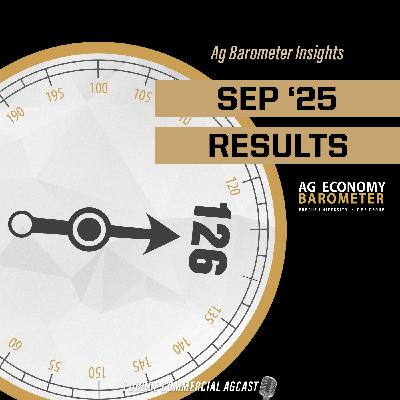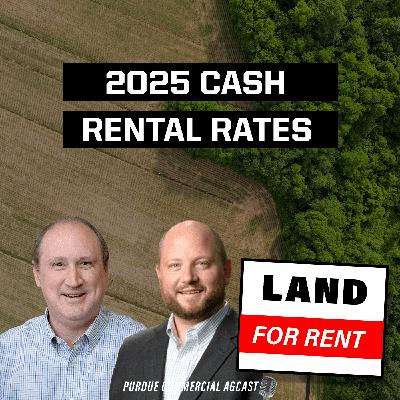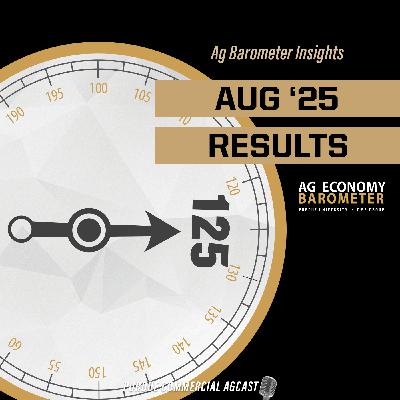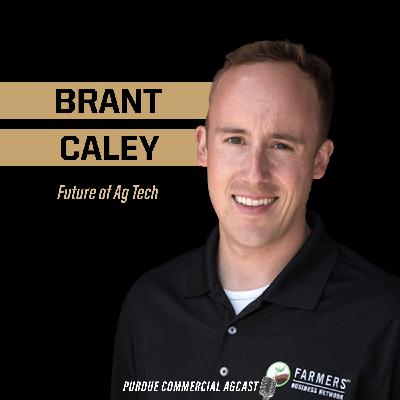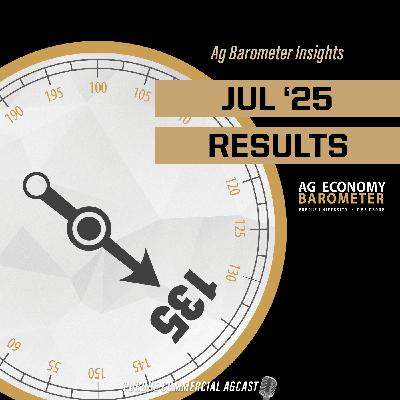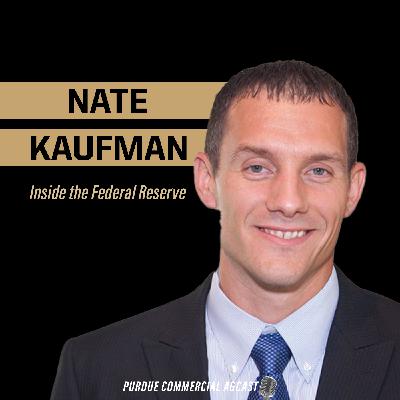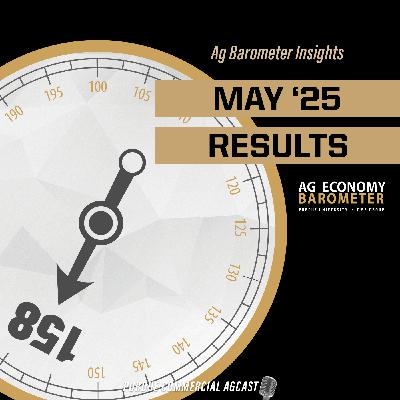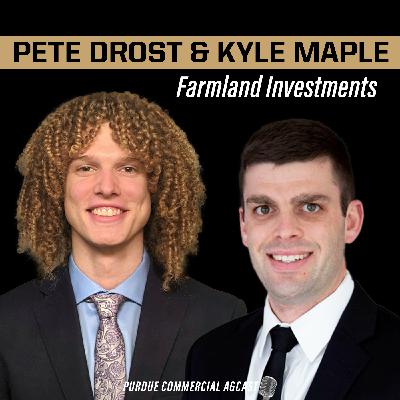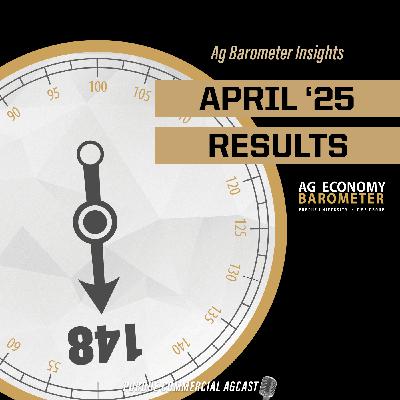Discover Purdue Commercial AgCast
Purdue Commercial AgCast

Purdue Commercial AgCast
Author: Purdue Center for Commercial Agriculture
Subscribed: 34Played: 1,255Subscribe
Share
© Copyright 2024 All rights reserved.
Description
Farm management news and advice for top agricultural producers from ag economists at Purdue University’s Center for Commercial Agriculture.
205 Episodes
Reverse
Adaptability and strong relationships are becoming just as important as yields and costs in today’s farm economy—and that’s the focus of this episode of the Purdue Commercial AgCast. Chad Fiechter is joined by Ben Brown of the University of Missouri’s Food and Agricultural Policy Research Institute (FAPRI), along with guest hosts, graduate students Avery Pound and Jonah Armstrong, for a conversation that builds on Brown’s recent presentation at the Purdue Top Farmer Conference.
Following his talk on the long-term outlook for corn and soybean markets, Brown expands the discussion to explore how global economic conditions, energy markets, and commodity pricing trends influence farm profitability over time. While cotton is used as a case study in parts of the conversation, the focus remains on broader lessons that apply across crop and livestock operations, including long-run decision-making, strategic partnerships, and how changes in capital and land ownership are reshaping agriculture. The episode highlights why understanding market signals—and building the right relationships—matters for farmers navigating uncertainty and positioning their operations for the future.
Farmer sentiment dipped slightly in December, with the Purdue University/CME Group Ag Economy Barometer dropping 3 points to 136. The decline was attributable to a softening in producers’ long-term outlook. The Future Expectations Index fell 4 points from the previous month to 140, while the Current Conditions Index remained steady at 128. Crop producers expressed increased concern about the competitiveness of U.S. soybean exports as Brazil expands its role in global markets, contributing to the more cautious outlook. The survey was conducted Dec. 1-5, 2025.
Purdue ag economists James Mintert and Michael Langemeier review the results from the Ag Economy Barometer and give their insights into farmer sentiment and the farm economy.
The Ag Economy Barometer sentiment index is calculated each month from 400 U.S. agricultural producers’ responses to a telephone survey. Further details on the full report is available at https://purdue.edu/agbarometer. Slides and the transcript from the discussion can be found at https://purdue.ag/agcast204.
You can find the FULL video episode on our YouTube channel. Visit https://youtu.be/0Jnm3_yti_g to subscribe and watch.
Podcast provided by Purdue University's Center for Commercial Agriculture. For more economic information and insights on the Ag Economy Barometer, visit us at http://purdue.edu/commercialag.
Subscribe to audio: https://purdue.ag/agcast
Socials: https://twitter.com/PUCommercialAg, https://www.facebook.com/PUCommercialAg
Chad Fiechter and Todd Kuethe reflect on their conversations this past year and talk about future plans. They cover past discussions with notable guests, including Nate Kauffman from the Federal Reserve, Matt Erickson from the Senate, Joe Balagtas from the White House, ag investing consultant Joe Suttles, and Indian hog farmer Brian Martin. Todd shares his upcoming sabbatical plans to teach economies on the Semester at Sea program, while they both share more on their recent trip to Arkansas to learn about rice farming. They explore the impact of AI in agriculture and highlight the importance of understanding different agricultural practices and community perspectives. The conversation wraps up with light-hearted discussions on personal preferences and their hopes for future podcast topics.
Find all the past episodes discussed: https://purdue.ag/agcast
Podcast provided by Purdue University's Center for Commercial Agriculture. For more economic and farm management information, visit us at http://purdue.edu/commercialag.
Transcript from the discussion can be found at https://purdue.ag/agcast203.
Check out all of our Purdue Commercial AgCast video interviews on YouTube: https://www.youtube.com/channel/UCS0sw5w6odSS111rbY1glHw
Socials: https://twitter.com/PUCommercialAg, https://www.facebook.com/PUCommercialAg, https://www.linkedin.com/company/center-for-commercial-agriculture
Whoosh in-out #1 by beman87 -- https://freesound.org/s/162841/ -- License: Attribution 3.0
November brought the highest farmer sentiment reading since June, with the Purdue University/CME Group Ag Economy Barometer jumping 10 points from October to 139. The increase was driven primarily by producers’ more optimistic outlook for the future, as the Future Expectations Index climbed 15 points to 144, while the Current Conditions Index dipped 2 points to 128. November’s survey is the first conducted after the late-October announcement of a U.S.-China trade pact that includes provisions to expand U.S. agricultural exports and revealed a notable improvement in producers’ confidence in future export opportunities. Sentiment also received support from a sharp rise in crop prices between mid-October and mid-November. The barometer survey took place Nov. 10-14.
Purdue ag economists James Mintert and Michael Langemeier review the results from the November Ag Economy Barometer and give their insights into farmer sentiment and the farm economy.
The Ag Economy Barometer sentiment index is calculated each month from 400 U.S. agricultural producers’ responses to a telephone survey. Further details on the full report is available at https://purdue.edu/agbarometer. Slides and the transcript from the discussion can be found at https://purdue.ag/agcast202.
You can find the FULL video episode on our YouTube channel. Visit https://youtu.be/KDhYF5vTo_M to subscribe and watch.
Podcast provided by Purdue University's Center for Commercial Agriculture. For more economic information and insights on the Ag Economy Barometer, visit us at http://purdue.edu/commercialag.
Subscribe to audio: https://purdue.ag/agcast
Socials: https://twitter.com/PUCommercialAg, https://www.facebook.com/PUCommercialAg
Brian Martin, a fifth-generation pig farmer from Indiana, joins hosts Todd Kuethe and Chad Fiechter in this episode of Purdue Commercial AgCast. Martin shares his extensive experience in raising swine across the country, his involvement with the Indiana Pork Producers Association, and the vital role of internships and diverse experiences in agriculture. He also shares insight into the evolution of the hog industry, the complexities of farm management, and the impact of state policies on agriculture. From strategic business decisions to the challenges of labor and disease management, this episode provides a comprehensive look at the world of modern pig farming.
Learn more about Martin Family Farms: https://teammartinfarms.com/
Podcast provided by Purdue University's Center for Commercial Agriculture. For more economic and farm management information, visit us at http://purdue.edu/commercialag.
Transcript from the discussion can be found at https://purdue.ag/agcast201.
Subscribe to audio: https://purdue.ag/agcast
Check out all of our Purdue Commercial AgCast video interviews on YouTube: https://www.youtube.com/channel/UCS0sw5w6odSS111rbY1glHw
Socials: https://twitter.com/PUCommercialAg, https://www.facebook.com/PUCommercialAg, https://www.linkedin.com/company/center-for-commercial-agriculture
U.S. farmer sentiment edged slightly higher in October, with the Purdue University/CME Group Ag Economy Barometer rising 3 points to a reading of 129. The increase was fueled primarily by a rise in the Index of Current Conditions, which climbed 8 points to 130, while the Index of Future Expectations was virtually unchanged at 129, just 1 point higher than in September. Farmers’ appraisals of current conditions highlight a “tale of two economies”: Livestock producers remain highly optimistic about their farm conditions, partly supported by record-high profitability in the beef sector, while crop producers report a more pessimistic view of the current situation on their farms due to low profit margins across major crop enterprises. The barometer survey took place Oct. 13-17.
Purdue ag economists James Mintert and Michael Langemeier review the results from the October Ag Economy Barometer and give their insights into farmer sentiment and the farm economy.
The Ag Economy Barometer sentiment index is calculated each month from 400 U.S. agricultural producers’ responses to a telephone survey. Further details on the full report is available at https://purdue.edu/agbarometer. Slides and the transcript from the discussion can be found at https://purdue.ag/agcast198.
You can find the FULL video episode on our YouTube channel. Visit https://youtu.be/Ujekqgm6DQk to subscribe and watch.
Podcast provided by Purdue University's Center for Commercial Agriculture. For more economic information and insights on the Ag Economy Barometer, visit us at http://purdue.edu/commercialag.
Subscribe to audio: https://purdue.ag/agcast
Socials: https://twitter.com/PUCommercialAg, https://www.facebook.com/PUCommercialAg
Joe Balagtas, a former senior economist at the White House's Council of Economic Advisors (CEA) and professor of agricultural economics at Purdue joins colleague hosts Todd Kuethe and Chad Fiechter in this episode of the Purdue Commercial AgCast. Balagtas shares his unique experiences working at the CEA during the Trump administration and his role in providing the President with critical economic information. He provides a behind-the-scenes glimpse of his daily life, the stress and fulfillment of working under extreme pressure, and the lessons learned which he brings back to academia. The conversation provides insight into the importance of having specialized economists in policymaking and the dynamic nature of the White House during significant events like the trade war and COVID-19 pandemic.
Podcast provided by Purdue University's Center for Commercial Agriculture. For more economic and farm management information, visit us at http://purdue.edu/commercialag.
Slides and the transcript from the discussion can be found at https://purdue.ag/agcast199.
Subscribe to audio: https://purdue.ag/agcast
Check out all of our Purdue Commercial AgCast video interviews on YouTube: https://www.youtube.com/channel/UCS0sw5w6odSS111rbY1glHw
Socials: https://twitter.com/PUCommercialAg, https://www.facebook.com/PUCommercialAg, https://www.linkedin.com/company/center-for-commercial-agriculture
Farmer sentiment held steady in September, as the Purdue University/CME Group Ag Economy Barometer rose just 1 point to a reading of 126. However, there was a shift in producers’ perceptions of current conditions and their expectations for the future. The Index of Current Conditions fell 7 points to 122, while the Index of Future Expectations climbed 5 points to 128. The survey was conducted following the U.S. Department of Agriculture’s release of the September Crop Production report and the World Agricultural Supply and Demand Estimates report. These reflected farmers’ concerns about current conditions, particularly over record-high corn and soybean yields, which were pressuring crop prices. At the same time, optimism about the future was supported by farmers’ belief that U.S. policy is “headed in the right direction” and by expectations that potential government support, like the 2019 Market Facilitation Program (MFP), will provide payments to farmers in compensation for lower commodity prices. The barometer survey took place Sept. 15-19.
Purdue ag economists James Mintert and Michael Langemeier review the results from the September Ag Economy Barometer and give their insights into farmer sentiment and the farm economy.
The Ag Economy Barometer sentiment index is calculated each month from 400 U.S. agricultural producers’ responses to a telephone survey. Further details on the full report is available at https://purdue.edu/agbarometer. Slides and the transcript from the discussion can be found at https://purdue.ag/agcast198.
You can find the FULL video episode on our YouTube channel. Visit https://youtu.be/Ujekqgm6DQk to subscribe and watch.
Podcast provided by Purdue University's Center for Commercial Agriculture. For more economic information and insights on the Ag Economy Barometer, visit us at http://purdue.edu/commercialag.
Subscribe to audio: https://purdue.ag/agcast
Socials: https://twitter.com/PUCommercialAg, https://www.facebook.com/PUCommercialAg
Jim Jansen from the University of Nebraska-Lincoln, joins Michael Langemeier to discuss cash rent considerations for irrigation, pasture, and hay leases. They provide factors affecting cash rent including maintenance costs, insurance, and land productivity and emphasize the importance of clear lease agreements. This episode highlights terms related to the three P's of irrigation: pivot, pump, and power; the big three in pasture: fencing, water supply, and controlling noxious weeds; as well as cow-calf pairs and hay cash rental calculations. Offering practical advice for both landlords and operators on fair rental agreements.
You can find the FULL video episode on our YouTube channel. Visit https://youtu.be/NbMwKl2w2GY to subscribe and watch.
To learn more about Indiana's 2025 farmland cash rental rates, listen to episode #195 on the Purdue Commercial #AgCast. https://purdue.ag/agcast
Podcast provided by Purdue University's Center for Commercial Agriculture. Slides and the transcript from the discussion can be found at https://purdue.ag/agcast197.
Socials: https://twitter.com/PUCommercialAg, https://www.facebook.com/PUCommercialAg
If you are enjoying the podcast, tweet us using #AgCast.
For the full August Purdue Agricultural Economics Report, visit: https://purdue.ag/paer.
Joe Suttles, a consultant in ag investing, joins hosts Todd Kuethe and Chad Fiechter in this episode of the Purdue Commercial AgCast to discuss his role and insights into private equity investments in agriculture. Suttles outlines his responsibilities in working with fund managers and managing existing investments to solve issues. He shares insight into the complexities of agricultural investments, emphasizing the importance of long-term focus and the intricate nature of managing agricultural production businesses. The conversation touches on the alignment and agency challenges in ag businesses, the role of institutional investors, and the potential future trends in farm management and consolidation.
Check out all our “Purdue Commercial AgCast” podcast episodes: https://purdue.ag/agcast
Purdue ag economists Todd Kuethe and Michael Langemeier discuss Indiana farmland cash rental rates on this, the second of two episodes reviewing the 2025 Purdue Farmland Values and Cash Rental Rates survey results. The survey shows Indiana cash rents continue to rise by about one and a half percent. The episode shares historical trends in cash rents, and how cash rents compare to share and flex lease rents, regional differences, net returns to land, and the increasing interest in flexible cash leases from both landowner and tenant perspectives. Additional resources and detailed survey results are available on the Center for Commercial Agriculture website.
You can find the FULL video episode on our YouTube channel. Visit https://youtu.be/6agOo0Pif9U to subscribe and watch.
To learn more about Indiana's 2025 farmland cash rental rates, listen to the first podcast in this series, episode #194 on the Purdue Commercial #AgCast.
Podcast provided by Purdue University's Center for Commercial Agriculture. Slides and the transcript from the discussion can be found at https://purdue.ag/agcast195.
Socials: https://twitter.com/PUCommercialAg, https://www.facebook.com/PUCommercialAg
If you are enjoying the podcast, tweet us using #AgCast.
For the full August Purdue Agricultural Economics Report, visit: https://purdue.ag/paer.
Join Purdue ag economists Todd Kuethe and Michael Langemeier as they discuss Indiana farmland values on this, the first of two episodes reviewing the 2025 Purdue Farmland Values and Cash Rental Rates survey results. The survey shows Indiana land prices continue to rise and are anticipated to continue a modest increase for the rest of 2025 for most of the state. The episode shares insights into U.S. and Indiana farmland value trends, agricultural balance sheets, debt-to-asset ratios, the impact of various economic factors on land values, and future expectations for farmland values.
You can find the FULL video episode on our YouTube channel. Visit https://youtu.be/GOClD4XQz9Y to subscribe and watch
To learn more about Indiana's 2025 farmland cash rental rates, listen to the second podcast in this series, episode #195 on the Purdue Commercial #AgCast.
Podcast provided by Purdue University's Center for Commercial Agriculture. Slides and the transcript from the discussion can be found at https://purdue.ag/agcast194.
Socials: https://twitter.com/PUCommercialAg, https://www.facebook.com/PUCommercialAg
If you are enjoying the podcast, tweet us using #AgCast.
For the full August Purdue Agricultural Economics Report, visit: https://purdue.ag/paer.
Farmer sentiment dipped again in August as the Purdue University-CME Group Ag Economy Barometer Index fell 10 points to 125. Producers were markedly less optimistic about the future in August as the Index of Future Expectations dropped 16 points to 123. This was the lowest reading for the future index since last September. Purdue ag economists James Mintert and Michael Langemeier share insights into the results of the August 2025 survey, conducted from August 11-15, in this episode of the Purdue Commercial AgCast. Sentiment differed widely among producers depending on whether their farm is primarily a crop operation or a livestock operation. Responses from crop producers this month were much less optimistic than those from livestock producers, which indicates the disparity in profitability between crop and livestock enterprises. Beef cattle operations in particular are experiencing record profitability as the smallest cattle inventory since 1951 has pushed cattle prices to record levels. This stands in sharp contrast to returns for crop production which have weakened in 2025.
The Ag Economy Barometer sentiment index is calculated each month from 400 U.S. agricultural producers’ responses to a telephone survey. Further details on the full report is available at https://purdue.edu/agbarometer. Slides and the transcript from the discussion can be found at https://purdue.ag/agcast193.
You can find the FULL video episode on our YouTube channel. Visit https://youtu.be/up5ty6AsICo to subscribe and watch.
Podcast provided by Purdue University's Center for Commercial Agriculture. For more economic information and insights on the Ag Economy Barometer, visit us at http://purdue.edu/commercialag.
Join Chad Fiechter and Todd Kuethe as they explore ag technology and the ag economy with guest Brant Caley. Caley, an expert in ag tech, discusses his journey, from playing FFA basketball to working with companies like Trimble, Farmers Business Network (FBN), and now Gradable. The discussion covers the evolution of farm technology, sustainability in grain marketing, the future of agricultural technology - and the potential impact of emerging technologies like AI and LLMs. Whether you're a farmer deeply invested in ag tech or simply curious about the technological transformations reshaping agriculture, this episode is a must-listen.
Podcast provided by Purdue University's Center for Commercial Agriculture. For more farm management information and insights, visit us at http://purdue.edu/commercialag.
Gradable App: https://apps.apple.com/us/app/gradable/id6742845206
Farmer sentiment continues to weaken, as the Purdue University/CME Group Ag Economy Barometer declined again in July. The barometer fell 11 points to 135 from June, a reading that resulted from U.S. farmers’ weaker perceptions of both current conditions and future expectations. Purdue ag economists James Mintert and Michael Langemeier share insights into the results of the July 2025 survey, conducted from July 7-11, in this episode of the Purdue Commercial AgCast. Weak crop prices, a squeeze on farm margins, and a notable difference in sentiment between crop and livestock producers are key factors to the weakened sentiment. Despite high input costs and concerns on long-term profitability, recent policy changes and improved expectations for ag exports, have farmers responding that U.S. policy is headed "in the right direction."
The Ag Economy Barometer sentiment index is calculated each month from 400 U.S. agricultural producers’ responses to a telephone survey. Further details on the full report is available at https://purdue.edu/agbarometer. Slides and the transcript from the discussion can be found at https://purdue.ag/agcast191.
You can find the FULL video episode on our YouTube channel. Visit https://youtu.be/kRT0OT9cYew to subscribe and watch.
Podcast provided by Purdue University's Center for Commercial Agriculture. For more economic information and insights on the Ag Economy Barometer, visit us at http://purdue.edu/commercialag.
Nate Kauffman, Omaha Branch Executive of the Federal Reserve Bank of Kansas City, joins hosts Todd Kuethe and Chad Fiechter in this episode of the Purdue Commercial AgCast. Kauffman explains the structure and function of the Federal Reserve System, including the roles of the Board of Governors, the 12 regional reserve banks, and their respective branch offices, and shares how monetary policy is set and the importance of regional input in policy decisions. Kauffman highlights his role in representing Nebraska and the agricultural sector, ensuring their unique economic conditions are considered in national policy discussions. The episode also touches on the use of data and industry interaction in formulating economic insights. Additionally, Kauffman shares anecdotes and practical experiences, emphasizing the Fed’s commitment to transparency and public engagement.
Podcast provided by Purdue University's Center for Commercial Agriculture. For more farm management information and insights, visit us at http://purdue.edu/commercialag.
Farmer sentiment weakened in June as the Purdue University-CME Group Ag Economy Barometer fell to 146, down from 158 a month earlier. Purdue ag economists James Mintert and Michael Langemeier share their insight into the results of the June 2025 survey, conducted from June 9-13, in this episode of the Purdue Commercial AgCast. Key takeaways include a sharp decline in the Future Expectation Index, a stable Current Condition Index, a drop in the Farm Financial Performance Index, and a surprising rise in the Farm Capital Investment Index. The episode explores various factors impacting farmer sentiment, such as policy uncertainty, trade, tariffs, input costs, and labor issues.
The Ag Economy Barometer sentiment index is calculated each month from 400 U.S. agricultural producers’ responses to a telephone survey. Further details on the full report is available at https://purdue.edu/agbarometer. Slides and the transcript from the discussion can be found at https://purdue.ag/agcast189.
You can find the FULL video episode on our YouTube channel. Visit https://youtu.be/1C5-A2Z_vPg to subscribe and watch.
Podcast provided by Purdue University's Center for Commercial Agriculture. For more economic information and insights on the Ag Economy Barometer, visit us at http://purdue.edu/commercialag.
Farmer sentiment reached a four-year high in May. Purdue ag economists James Mintert and Michael Langemeier share their insight into the results of the May 2025 Purdue University-CME Group Ag Economy Barometer survey, conducted from May 12-16, in this episode of the Purdue Commercial AgCast. The barometer rose 10 points to 158, the highest since May 2021, driven by optimism about future and current farm conditions. The Farm Financial Performance Index also saw an increase, while the Farm Capital Investment Index declined slightly. Other key points include a surprising jump in the Short-Term Farmland Value Expectation Index, shifting attitudes toward ag exports, and concerns about labor impacts due to U.S. immigration policies. Current farmer concerns remain centered on high input costs and interest rates, and there is notable interest in the passage of a new 2025 farm bill.
The Ag Economy Barometer sentiment index is calculated each month from 400 U.S. agricultural producers’ responses to a telephone survey. Further details on the full report is available at https://purdue.edu/agbarometer. Slides and the transcript from the discussion can be found at https://purdue.ag/agcast188.
You can find the FULL video episode on our YouTube channel. Visit https://youtu.be/GRm0BZYXeR0 to subscribe and watch.
Podcast provided by Purdue University's Center for Commercial Agriculture. For more economic information and insights on the Ag Economy Barometer, visit us at http://purdue.edu/commercialag.
Kyle Maple and Pete Drost, professionals in the farmland investment space join hosts Todd Kuethe and Chad Fiechter in this episode of Purdue Commercial AgCast. Maple and Drost share their backgrounds, roles within US Agriculture, and day-to-day tasks in farmland asset management. They share how they identify investment opportunities, source deals through various networks, and the importance of both financial knowledge and effective communication in their field. The discussion also touches on the challenges of managing permanent crops, the evolution of investment management firms in agriculture, and the balancing act of maintaining long-term relationships with farm operators. The conversation provides a look into the impact of water regulations, sustainability in farming, and educating investors about the benefits of farmland as an asset class.
Farmer sentiment improved in April as producers expressed more optimism about current and future conditions on their farms. Purdue ag economists James Mintert and Michael Langemeier share their insight into the results of the April 2025 Ag Economy Barometer survey, conducted from April 14-21, in this episode of the Purdue Commercial AgCast. The Purdue University/CME Group Ag Economy Barometer rose 8 points to a reading of 148, up from 140 in March. Key topics include the surprising economic optimism among livestock producers, farm capital investment trends, and ongoing trade policy impacts. The conversation also covers survey respondents' expectations for farm input costs, interest rates, and the potential long-term effects of tariffs on U.S. agriculture.
The Ag Economy Barometer sentiment index is calculated each month from 400 U.S. agricultural producers’ responses to a telephone survey. Further details on the full report is available at https://purdue.edu/agbarometer. Slides and the transcript from the discussion can be found at https://purdue.ag/agcast186.
You can find the FULL video episode on our YouTube channel. Visit https://youtu.be/ZAK199Yq61c to subscribe and watch.
Podcast provided by Purdue University's Center for Commercial Agriculture. For more economic information and insights on the Ag Economy Barometer, visit us at http://purdue.edu/commercialag.









